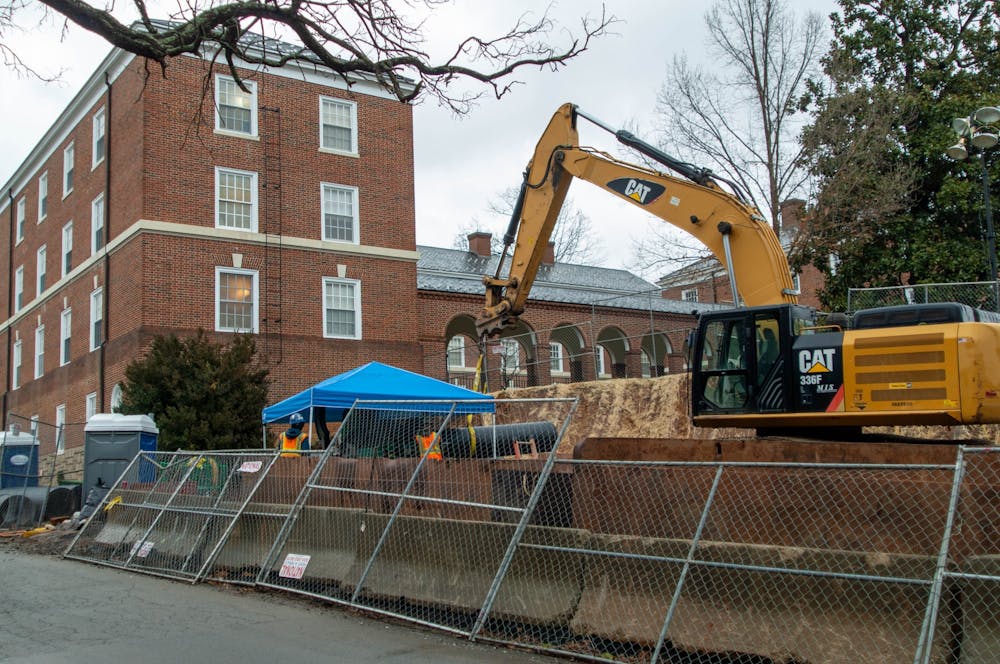With multiple construction projects currently underway across Grounds, students are navigating changes to accessible routes and noise disturbances while facilities management seeks to minimize impacts. Active construction sites include the Ivy Corridor on Emmett St., Alderman Library, Gilmer Hall and the road leading to Newcomb behind Brown Residential College.
One of the primary disturbances affecting students on Grounds is the projects closer to dorms — the effects of which have even penetrated into living areas.
First-year College student Amelia Pearson said that while living in Gibbons dormitory, she has experienced noise disturbances from the construction on Gilmer Hall on McCormick Rd. — construction is ongoing to renovate and modernize the building.
“Most mornings last semester I would wake up and immediately hear the beeping from trucks backing up, always before my alarm went off,” Pearson said. “Eventually I got used to it, but still I was so annoyed when I heard it and was so glad for the weekends when it stopped.”
Recent utility infrastructure construction behind Brown has also elicited complaints from many community members, particularly those living in the housing portals adjacent to the site, Davis and Tucker — buildings that are part of the Brown, a living community for upperclassmen students located next to Newcomb Hall. The project is scheduled to be completed this summer and will connect a water loop through west Grounds, allowing for increased cooling efficiency.
Jason Almas, Brown resident and first-year College student, spoke to the bright lights and noise disturbances that the residents have experienced.
“I've been told that [the building] shakes all day long and that they can't take Zoom calls,” Almas said. “One person is actually getting their hearing checked.”
Almas said the list of side effects to the constant construction on Newcomb Rd. for Brown residents has even expanded into the night and altered the residential area’s accessibility.
“There's been generators left overnight that have floodlights on them, but no one's working there overnight,” Almas said. “It's also blocking one of our accessible entrances by Newcomb Hall.”
During finals week of last semester, management at Capital Construction and Renovations, the company responsible for the renovations, pushed the starting times from 8 a.m. to 10 a.m., but later moved back to the usual 8 a.m. schedule after exams.
In reference to the expansive presence of construction on Grounds, Mark Stanis, director of Capital Construction and Renovations — the group overseeing construction across Grounds — acknowledged the potential for inconveniences, but said that Facilities Management makes an effort to work with students.
“If we miss something and we get a report of a barrier or other complaints, we immediately try to address it and if we need to even change the sequence of work to make sure it's better, we'll do that as well,” Stanis said. “Our main concern is of course safety, but we try to minimize the big impacts.”
Stanis urged concerned students to report any complaints to him directly at mss5s@virginia.edu or to the specific construction site.
“With all the work we've got going on, we want to make sure that people feel safe and can get around Grounds easily,” Stanis said.
The largest project, the renovation of Alderman Library, began in spring 2020 and is scheduled to be completed by spring 2023 — the renewal is estimated to cost $160 million. According to Senior Project Manager Kit Meyer, updates have been in discussion since 2000, as the library has not seen any major renovations since its construction in 1938. Per the project’s website, the construction serves to “bring the library up to current standards of safety, accessibility, and service,” and create “a contemporary library with modern amenities suited to the needs of its users.”
Meyer said that administration realizes the impact large-scale construction work poses to students and explained that they will attempt to save the most disruptive work for mid-June to mid-August when on-Grounds occupancy is at a minimum.
“It’s a large project, of course — it's almost an island in the middle of central Grounds that people have to walk around,” Meyer said.
To mitigate the changes to commuters’ routines, administration has attempted to provide visual aids to help people circumvent the construction’s path closures. Meyer explained that signs have also been placed to communicate the reasons for the construction.
“We've put up a lot of renderings,” Meyer said. “Sort of the story of the project, what the benefit is, so if you're just starting this year … at least you knew why there was no main library and you could see what was going to be coming in more specific ways.”
Meyer said that she understands the construction can be aesthetically displeasing but hopes that students keep in mind the eventual benefits, especially from a sustainability perspective — the former cost of heating and cooling the library was $800,000 a year, but after renovations, it will decrease to under $400,000 a year. The lowered costs of heating and cooling means minimizing energy costs by reducing energy expenditure, thereby conserving resources and improving the library’s sustainability.
“That's where we probably should try to do a better job of showing how these are projects that aren't just replacing pipes but that are making our system so much more efficient,” Meyer said. “These utility projects are having a huge effect on large strategic goals to use less power, to be more efficient and not add to greenhouse gasses.”
Ultimately, these renovations will aid the University in achieving its goal of achieving greater sustainability, including becoming carbon neutral by 2030 and fossil fuel-free by 2050.







